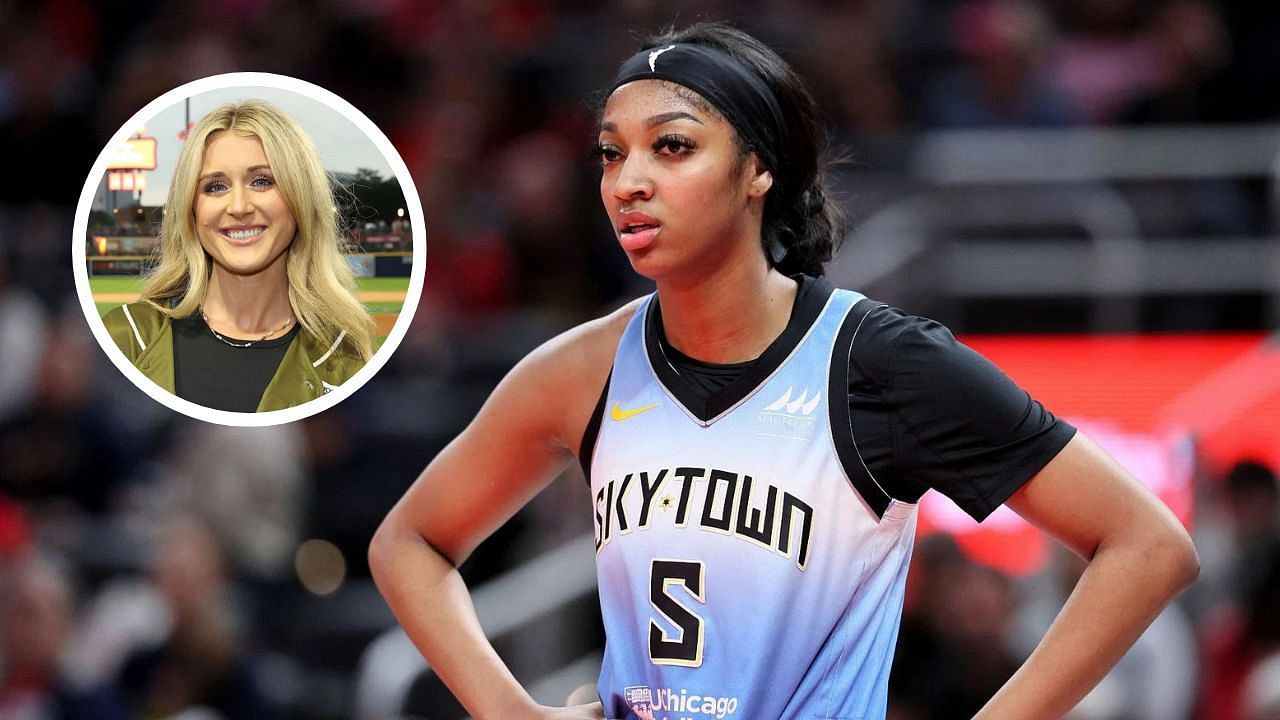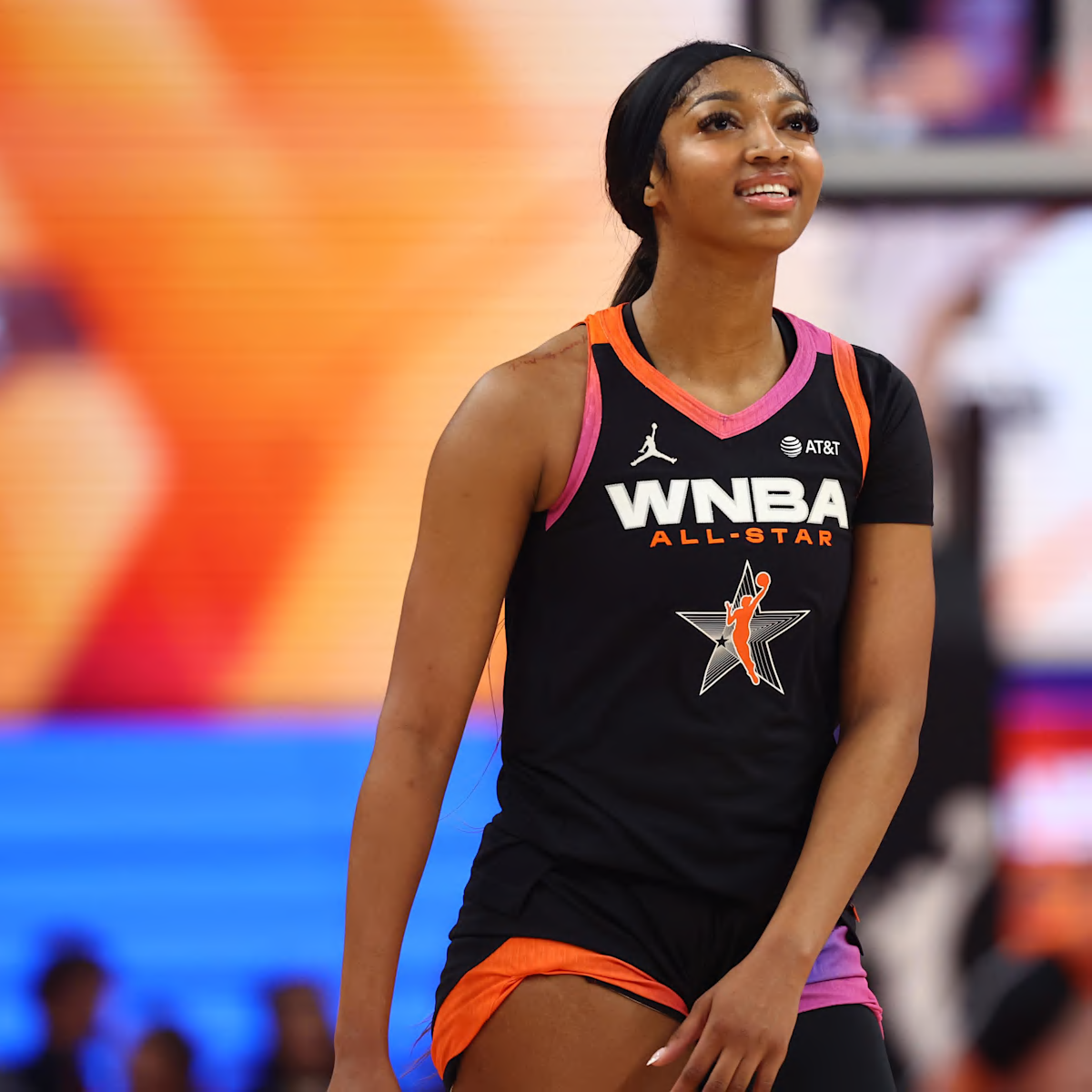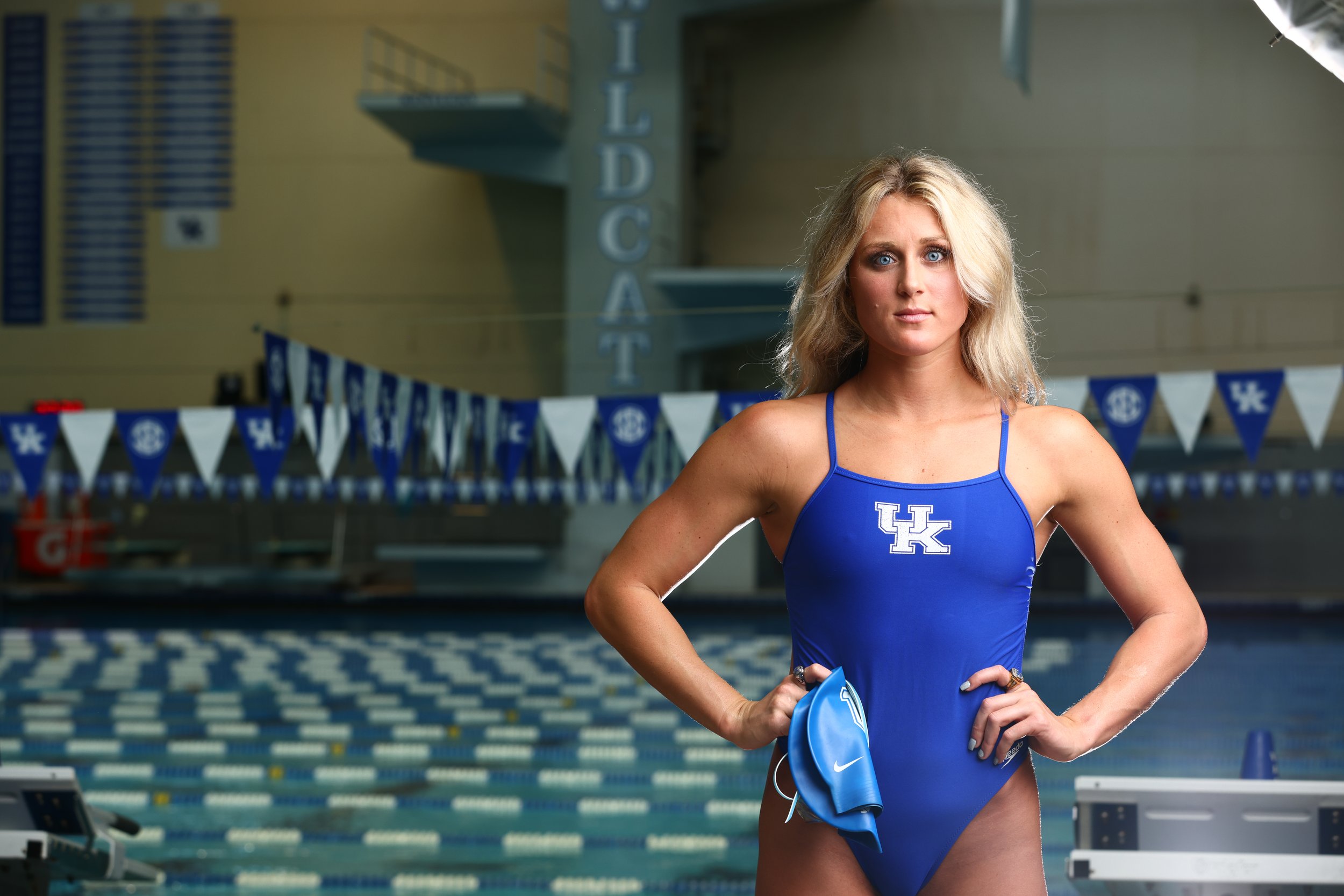
Riley Gaines continues her mockery of Angel Reese following controversial ejection/
Former competitive swimmer Riley Gaines continued to criticize Angel Reese, this time after the Chicago Sky star was ejected in a game on Tuesday. Gaines has been vocal about her displeasure about Reese’s supposed shots at her rival Caitlin Clark.
In a post on his official X account, Gaines acknowledged Reese’s potential to be a great role model for young people in the country. However, she pointed out the Sky forward’s ejection against the New York Liberty as one of her unwanted qualities.
“Angel Reese has the potential to be a great role model for young girls…but she’s shown herself to be arrogant, unprofessional, & jealous,” Gaines wrote.
“They’re gonna occasionally misstep” – Adam Silver breaks silence on Pat McAfee’s ‘white b*tch’ remarks on Caitlin Clark
“All the haters quiet now” “Busy trying to be a social media influencer” – Angel Reese’s double-double gets mixed reactions amidst shooting woes
Mystics’ Aaliyah Edwards & other players reveal their pick for Mavericks vs Celtics NBA Finals: “I’ll go with European spice”
Angel Reese was ejected for the first time in her career on Tuesday against the New York Liberty at home in the Wintrust Arena in Chicago. Reese was not happy with a call around the 2:31 mark in the fourth quarter. She was called for two quick technical fouls by referee Charles Watson.
The first technical was due to what Reese said to Watson, while the second came after she did the hand wave. It’s a gesture that is not popular among referees in both the NBA and WNBA.
As for Riley Gaines, it’s not the first time she has criticized the 22-year-old forward. Gaines even called Reese “jealous” and “insecure” for her comments about charter flights. It was thought to be a shot at Caitlin Clark, but was reportedly directed toward Charles Barkley.
Nevertheless, a lot of former and current athletes have been unhappy with how the WNBA is handling the physicality around Clark. Even UConn head coach Geno Auriemma, who had some of his former players dismiss how Clark was being treated, thought that the Indiana Fever was being “targeted.”
Relative Articles
None found
Redirecting to another reading … (10s)
The world of women’s basketball has been no stranger to drama in recent years, and the latest chapter in this ongoing saga involves former competitive swimmer Riley Gaines and Chicago Sky star Angel Reese. Gaines, who has transitioned from the pool to the public spotlight as a vocal commentator on sports and gender issues, has once again set her sights on Reese, this time following a controversial ejection during a WNBA game. In a scathing critique, Gaines accused Reese of displaying arrogance, unprofessionalism, and envy—charges that have reignited debates about sportsmanship, rivalry, and the pressures of fame in the modern era of women’s athletics.

The incident that sparked this latest clash occurred during a matchup between the Chicago Sky and the New York Liberty in June 2024. With just over two minutes remaining in the game, Reese, a rising star in the WNBA, was ejected after receiving two quick technical fouls. The first stemmed from comments she made to referee Charles Watson, while the second came after she waved her hand dismissively at the official—a gesture widely regarded as a sign of disrespect in professional basketball. The ejection marked the first of Reese’s career and drew immediate attention, with opinions split between those who saw it as an overreaction by the referees and those who felt Reese’s behavior warranted the punishment.
:max_bytes(150000):strip_icc():focal(643x355:645x357)/Angel-Reese-Rookie-112724-tout-ece7f849972946149308bcde023db0e7.jpg) Riley Gaines, never one to shy away from controversy, wasted no time weighing in. Taking to X, she posted: “Angel Reese has the potential to be a great role model for young girls…but she’s shown herself to be arrogant, unprofessional, & jealous.” The statement was a direct jab at Reese, suggesting that her actions on the court reflected deeper character flaws. For Gaines, this wasn’t just about a single incident—it was part of a broader narrative she has been building around Reese, whom she has previously criticized for perceived slights against Indiana Fever rookie Caitlin Clark, Reese’s rival in the spotlight.
Riley Gaines, never one to shy away from controversy, wasted no time weighing in. Taking to X, she posted: “Angel Reese has the potential to be a great role model for young girls…but she’s shown herself to be arrogant, unprofessional, & jealous.” The statement was a direct jab at Reese, suggesting that her actions on the court reflected deeper character flaws. For Gaines, this wasn’t just about a single incident—it was part of a broader narrative she has been building around Reese, whom she has previously criticized for perceived slights against Indiana Fever rookie Caitlin Clark, Reese’s rival in the spotlight.
The roots of this feud trace back to the meteoric rise of both Reese and Clark in the WNBA. As two of the league’s most prominent young talents, their performances—and personalities—have been endlessly compared. Reese, known for her fiery competitiveness and unapologetic confidence, has often been cast as the antagonist to Clark’s more reserved, media-friendly demeanor. Gaines, who has positioned herself as a defender of traditional sports values, has repeatedly called out Reese for what she sees as unsportsmanlike conduct, including a now-deleted tweet from Reese that many interpreted as a dig at Clark’s early struggles with the Fever.
Gaines labeled that incident as “jealous” and “insecure,” setting the stage for her latest round of criticism.The ejection itself has fueled a broader conversation about officiating in the WNBA and the scrutiny faced by its players. Supporters of Reese, including Chicago Bulls star Lonzo Ball, who attended the game, argued that the call was questionable and overly harsh. Ball even offered to pay Reese’s $200 fine for the first technical foul, which the league upheld despite rescinding the second. Critics, however, point to Reese’s hand wave as a clear violation of the league’s standards, a moment of defiance that undermined her team in a critical game. For Gaines, it was Exhibit A in her case against Reese’s professionalism—or lack thereof.What makes Gaines’ critique particularly biting is her framing of Reese as a squandered opportunity. By acknowledging Reese’s potential as a role model, only to tear it down with accusations of arrogance and envy, Gaines paints a picture of a player who could be great but chooses pettiness over greatness. It’s a narrative that resonates with her audience, many of whom see her as a truth-teller unafraid to challenge the establishment. Yet, it also raises questions about her motives.
Gaines, who rose to prominence after her own battles in the swimming world over transgender participation, has built a platform on calling out what she perceives as injustices in sports. Is her focus on Reese a genuine critique, or a calculated move to stay relevant in the public eye?For Reese, the criticism is just another hurdle in a career already defined by resilience. From her NCAA championship run with LSU to her transition to the pros, she has faced relentless scrutiny—some fair, some tinged with racial and gender biases. Her ejection, while a misstep, is unlikely to derail her trajectory as one of the WNBA’s brightest stars. If anything, it adds to her reputation as a player who wears her emotions on her sleeve, for better or worse.As the dust settles, the Gaines-Reese saga underscores the growing pains of women’s basketball as it steps into a new era of visibility. With players like Reese and Clark driving unprecedented attention to the WNBA, every action is magnified, every rivalry dissected. Gaines’ harsh words may sting, but they also reflect the intense passion—and polarization—that now surrounds the sport. Whether Reese proves her detractors wrong with maturity and success, or continues to fuel the fire with her boldness, one thing is clear: this is a story far from its final chapter.

